Module 11 Way of life Unit 3 Language in use 课件37张
文档属性
| 名称 | Module 11 Way of life Unit 3 Language in use 课件37张 |  | |
| 格式 | pptx | ||
| 文件大小 | 3.3MB | ||
| 资源类型 | 教案 | ||
| 版本资源 | 外研版 | ||
| 科目 | 英语 | ||
| 更新时间 | 2021-09-15 20:19:14 | ||
图片预览

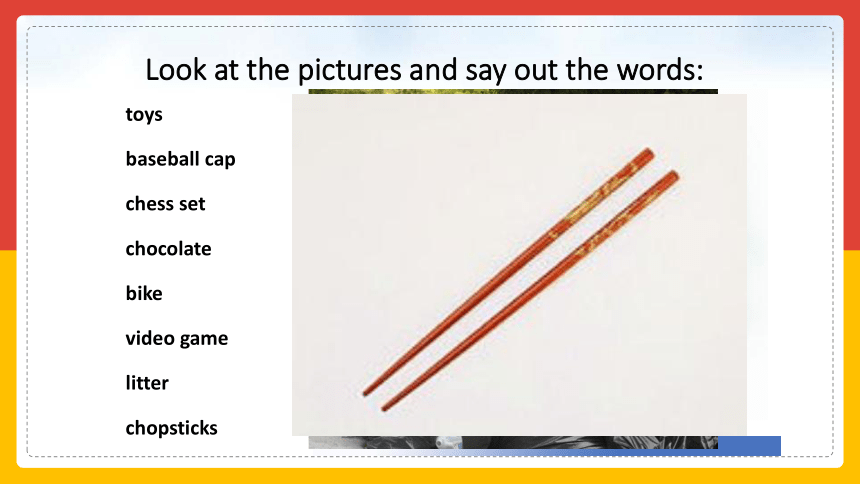
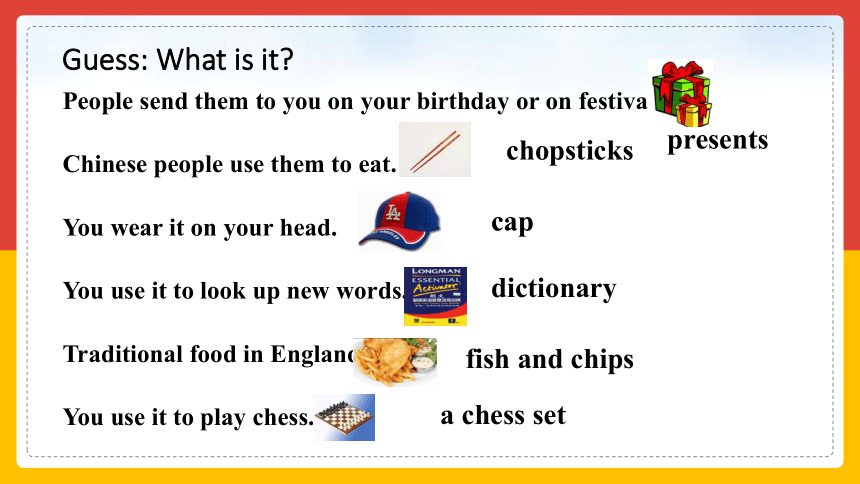
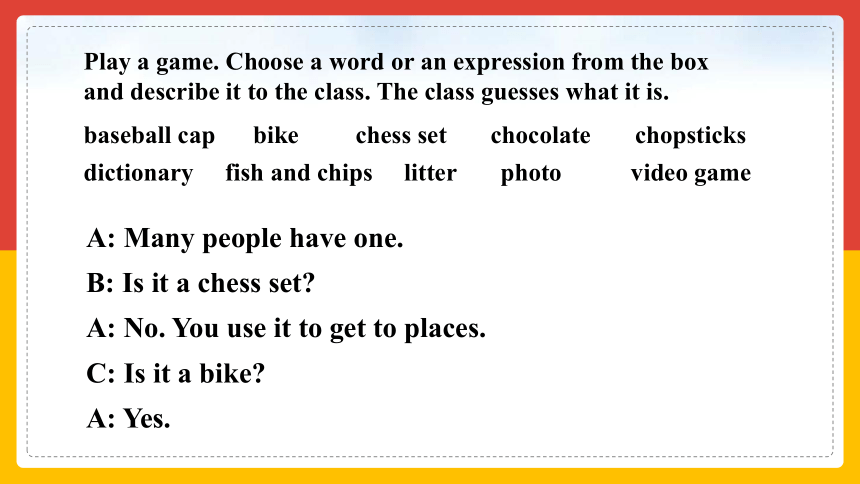
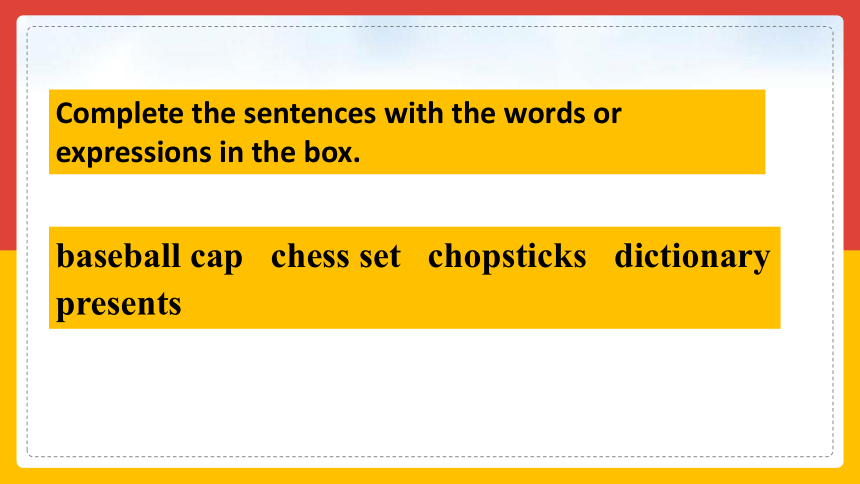
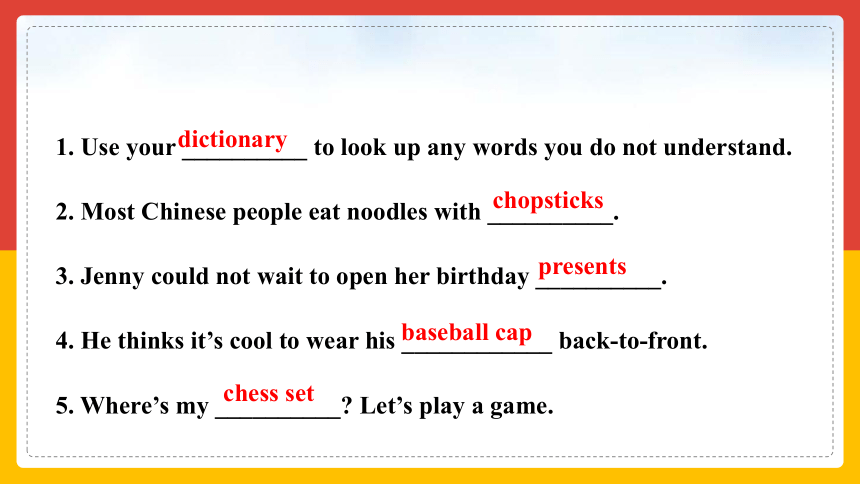
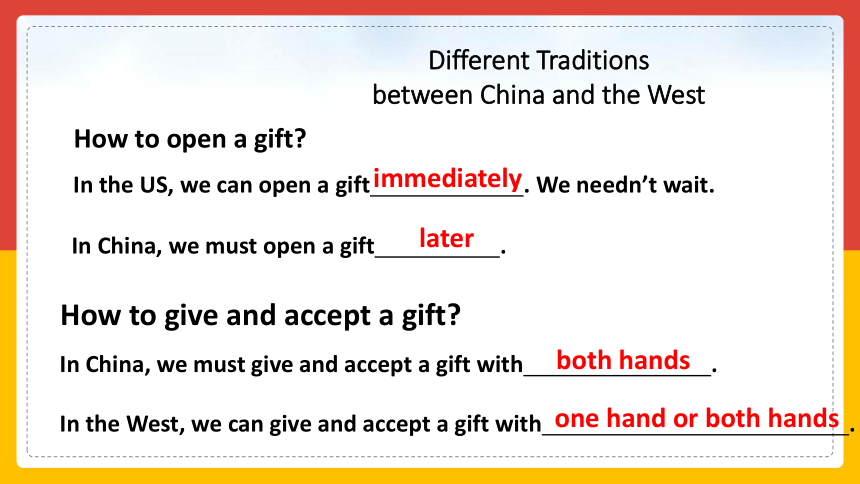
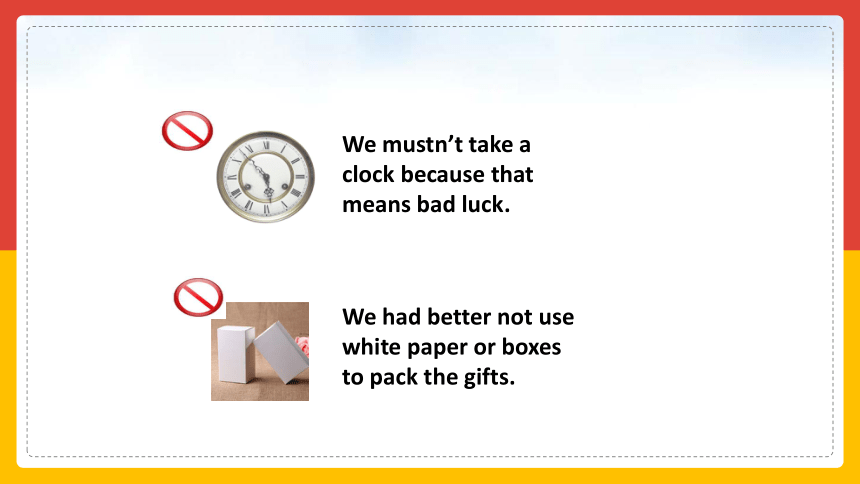
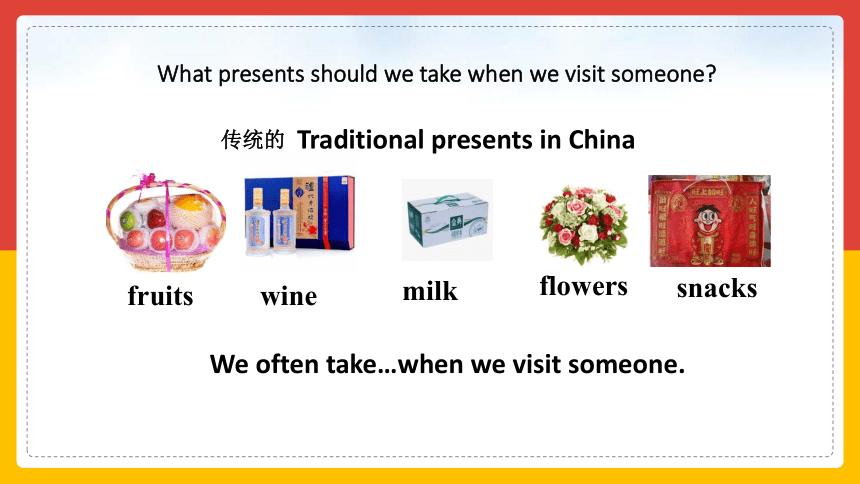



文档简介
(共37张PPT)
外研版
初中英语
七年级上册
Module
11
Ways
of
life
Unit
3
Language
in
use
Period
2
Look
at
the
pictures
and
say
out
the
words:
toys
baseball
cap
chess
set
chocolate
bike
video
game
litter
chopsticks
Guess:
What
is
it?
People
send
them
to
you
on
your
birthday
or
on
festivals.
Chinese
people
use
them
to
eat.
You
wear
it
on
your
head.
You
use
it
to
look
up
new
words.
Traditional
food
in
England.
You
use
it
to
play
chess.
presents
chopsticks
cap
dictionary
fish
and
chips
a
chess
set
baseball
cap
bike
chess
set
chocolate
chopsticks
dictionary
fish
and
chips
litter
photo
video
game
Play
a
game.
Choose
a
word
or
an
expression
from
the
box
and
describe
it
to
the
class.
The
class
guesses
what
it
is.
A:
Many
people
have
one.
B:
Is
it
a
chess
set?
A:
No.
You
use
it
to
get
to
places.
C:
Is
it
a
bike?
A:
Yes.
baseball
cap
chess
set
chopsticks
dictionary
presents
Complete
the
sentences
with
the
words
or
expressions
in
the
box.
1.
Use
your
__________
to
look
up
any
words
you
do
not
understand.
2.
Most
Chinese
people
eat
noodles
with
__________.
3.
Jenny
could
not
wait
to
open
her
birthday
__________.
4.
He
thinks
it’s
cool
to
wear
his
____________
back-to-front.
5.
Where’s
my
__________?
Let’s
play
a
game.
dictionary
chopsticks
presents
baseball
cap
chess
set
Different
Traditions
between
China
and
the
West
In
the
US,
we
can
open
a
gift
.
We
needn’t
wait.
In
China,
we
must
open
a
gift
.
In
the
West,
we
can
give
and
accept
a
gift
with
.
In
China,
we
must
give
and
accept
a
gift
with
.
How
to
give
and
accept
a
gift?
How
to
open
a
gift?
one
hand
or
both
hands
both
hands
later
immediately
We
mustn’t
take
a
clock
because
that
means
bad
luck.
We
had
better
not
use
white
paper
or
boxes
to
pack
the
gifts.
What
presents
should
we
take
when
we
visit
someone?
Traditional
presents
in
China
flowers
wine
milk
fruits
snacks
We
often
take…when
we
visit
someone.
传统的
Let’s
know
more
about
traditional
presents
in
the
world:
1.
在讲法语的地区不要送菊花,因为只有在葬礼时才使用菊花。
2.到英国人家作客,赠送女主人的鲜花,忌送百合花,因为百合花意味着死亡。亦忌赠黄玫瑰,他们认为此花象征分离。
3.
在德国,如果你应邀去作客,千万不要送女主人红玫瑰,因为它是赠送情人的礼品。
4.
给前苏联一些国家的人送花,结婚日最好向新娘赠送白色或粉色的鲜花,因为它象征着纯洁。送黄色鲜花时要慎重,因为它意味着变节。红色鲜花象征爱情和赞美。另外,花束必须由奇数组成奇数在这些国家是吉利的象征。
5.
在巴西,绛紫色的花主要用于葬礼,因此,千万不要送巴西人绛紫色的花。
6.
如果到芬兰、瑞典等北欧国家,要是应邀到主人家里作客,一定要给女主人带几束单数的鲜花,最好是5枝或7枝。
When
you
go
to
a
foreign
country,
it
is
always
best
to
check
what
people
usually
do,
so
you
do
not
make
mistakes.
犯错误,出错
检查,核对
Traditional
presents
1.
What
present
do
they
often
take
in
Britain?
2.
What
present
mustn’t
you
bring
in
Greece?
Read
and
answer:
Flowers.
White
flowers.
3.
Why
we’d
better
check
what
people
usually
do,
when
we
go
to
a
foreign
country?
Because
we
don’t
make
mistakes.
Traditional
presents
In
the
West,
people
often
take
flowers
when
they
visit
someone.
Different
flowers
have
different
meanings.
For
example,
people
often
give
red
roses
to
someone
they
love.
In
Greece,
you
must
not
give
white
flowers
because
that
means
that
someone
is
dead.
When
you
go
to
a
foreign
country,
it
is
always
best
to
check
what
people
usually
do,
so
you
do
not
make
mistakes.
犯错误,出错
检查,核对
外国
希腊
v.
意思是,意味着
n.
意义,含义
红玫瑰
make
mistakes
犯错误
mistake的用法
(1)
名词,错误
eg:There
are
a
lot
of
spelling
mistakes
in
your
article.
在你的文章中有许多拼写错误。
(2)
动词,把……错当成……
eg:He
was
mistaken
for
the
minister.
他被错当成牧师了。
(3)
动词,误会;误解
eg:You
mistook
my
meaning
entirely.
你完全误解了我的意思。
(4)
短语,by
mistake
错误地
eg:I
took
your
bag
by
mistake.
我错拿了你的包。
Key
points:
—I
wore
sports
shoes
to
the
dancing
party
yesterday
evening________mistake!
—Oh,dear,you
must
be
very
embarrassed
at
the
ball!
A.by B.for
C.in
D.of
A
【解析】根据句意可知感到非常的尴尬,一定是去舞会穿错了鞋子。by
mistake错误地,故选A。
2.
When
should
he
arrive?
He
had
better
arrive
on
time.
He
can’t
be
late.
A
foreign
guest
is
visiting
a
Chinese
family.
Give
him
some
advice:
1.
What
must
he
wear?
He
must
wear
clean
clothes.
He
had
better
wear
formal
clothes.
√
2.
When
should
he
arrive?
A
foreign
guest
is
visiting
a
Chinese
family.
Give
him
some
advice:
1.
Must
he
take
a
present?
He
should
take
a
present.
He
can
take
some
flowers
or
something
to
eat
or
drink.
2.
How
should
he
greet
people?
He
can
say
“nin
hao”
and
shake
hands
with
them.
2.
What
can’t
he
do
at
the
table?
He
mustn’t
talk
with
food
in
his
mouth.
He
mustn’t
stick
his
chopsticks
into
the
rice.
A
foreign
guest
is
visiting
a
Chinese
family.
Give
him
some
advice:
1.
What
must
he
do
at
the
table?
He
must
use
chopsticks
to
eat.
He
can
use
a
spoon
to
drink.
A
foreign
guest
is
visiting
a
Chinese
family.
Give
him
some
advice:
1.
What
should
he
do
after
dinner?
He
must
thank
the
family.
He
had
better
say
the
food
is
delicious.
2.
What
can’t
he
talk
about?
He
can’t
talk
about
death
.
Giving
advice
to
foreign
guests
who
are
visiting
a
Chinese
family.
The
key
word
above
may
help
you,
now
work
in
pairs
and
make
a
dialogue:
advice
wear
greeting
present
do
talk
about
to
wish
beginning
contents
ending
when
arrive
table
manners
A:
Hi,...!This
is
my
first
time
to
visit
China,
I'm
interested
to
know
all
the
Chinese
traditions.
B:
There
are
a
lot.
For
example,...must/
mustn't
/
can/
can't...
A:
What
else?
B:
When
...
,
we
must/
mustn't
/
can/
can't...
A:
It's
really
helpful
for
me
to
know
some
good
manners
in
your
country
B:
You're
welcome.
Make
a
dialogue
like
this:
Talk
about
Chinese
traditions:
What
must
they
wear?
What
mustn’t
they
talk
about?
What
can’t
they
do?
What
presents
can
they
bring?
When
must
you
arrive?
…
Write
some
advice
for
foreign
visitors
to
a
Chinese
family.
Think
about:
An
example:
When
you
visit
a
Chinese
family,you
should
wear
some
formal
clothes.You
needn't
bring
any
things,but
you
can't
come
too
late.
When
you
eat
there,you
can't
eat
first
or
alone.
After
the
meal,you
should
thank
the
host.
You
might
have
some
tea
after
the
meal
and
have
a
talk,but
you
can't
talk
about
death
or
stay
there
too
long.
When
you
leave,thank
them
again,and
invite
them
to
your
home.
Write
some
advice
for
foreign
visitors
to
a
Chinese
family.
Think
about:
Show
the
advice
you
wrote
in
Activity
9
to
your
group
members.
Choose
two
best
pieces
of
advice.
A:
1.
You
should
wear
some
formal
clothes.
2.
You
can't
come
too
late.
B:
1.
You
can't
eat
first
or
alone.
2.
After
the
meal,you
should
thank
the
host.
C:
…
D:
…
Show
the
advice
your
group
chose
in
Activity
10
to
the
whole
class.
Put
the
pieces
of
advice
together
to
form
the
advice
of
the
whole
class.
1.
You
should
wear
some
formal
clothes.
2.
You
can't
come
too
late.
3.
…
Send
the
advice
of
the
whole
class
to
your
foreign
friends
or
post
it
on
your
class
blog.
Summary
We
learn
some
modal
verbs:
must/
mustn’t;
can/
can’t
;
had
better/
had
better
not;
need;
should
2.
Learn
the
traditions
about
China
and
other
countries.
用can,
need,
must,
have
to或had
better的适当形式填空
1.—________
I
use
your
English?Chinese
dictionary?
—Yes,
of
course.
2.I
missed
the
train,
so
I
________
take
a
taxi.
3.You
________
come
to
the
meeting
if
you're
too
busy.
4.—________
I
finish
my
homework
now?
—No,
you
needn't.
5.You
look
very
tired.
You
___________
lie
in
bed
and
have
a
good
rest.
Can
had
to
needn't
Must
had
better
1.(河北)
There's
an
important
football
match
today.I
________
miss
it.
A.may
B.can't
C.must
D.needn't
2.(湖北)—I
have
a
serious
headache.________
I
go
to
school?
—No,
you
needn't.
A.Must
B.Can
C.Should
D.May
3.?
Michael?____?be?a?policeman,?for?he's?much?too?short.??
?
A.?needn't????
B.?can't???
C.?shouldn't??
?D.?won't
Choose
the
best
answer:
1.
He
_________
his
sweater,
because
it
was
a
little
hot.
2.
If
you
don’t
do
your
homework
carefully,
you
may
_____________.
3.
Don’t
push!
______________
to
get
on
the
bus.
4.
Look!
Some
people
are
_______________
at
the
bus
stop.
5.
He
often
_________,
because
he
always
has
too
much
work
to
do.
make
mistakes,
stay
up,
wait
one’s
turn,
take
off,
stand
in
a
line
?took
off
make
mistakes?
根据语境选择恰当的短语填空。
Wait
your
turn
standing
in
a
line?
stays
up
1.Write
a
passage
about
“Chinese
traditions”
.
2.
Read
the
passage
and
recite
the
passage.
3.
Finish
the
exercises.
中国人的筷子情结
教学课件
外研版
初中英语
七年级上册
非常感谢收看
外研版
初中英语
七年级上册
Module
11
Ways
of
life
Unit
3
Language
in
use
Period
2
Look
at
the
pictures
and
say
out
the
words:
toys
baseball
cap
chess
set
chocolate
bike
video
game
litter
chopsticks
Guess:
What
is
it?
People
send
them
to
you
on
your
birthday
or
on
festivals.
Chinese
people
use
them
to
eat.
You
wear
it
on
your
head.
You
use
it
to
look
up
new
words.
Traditional
food
in
England.
You
use
it
to
play
chess.
presents
chopsticks
cap
dictionary
fish
and
chips
a
chess
set
baseball
cap
bike
chess
set
chocolate
chopsticks
dictionary
fish
and
chips
litter
photo
video
game
Play
a
game.
Choose
a
word
or
an
expression
from
the
box
and
describe
it
to
the
class.
The
class
guesses
what
it
is.
A:
Many
people
have
one.
B:
Is
it
a
chess
set?
A:
No.
You
use
it
to
get
to
places.
C:
Is
it
a
bike?
A:
Yes.
baseball
cap
chess
set
chopsticks
dictionary
presents
Complete
the
sentences
with
the
words
or
expressions
in
the
box.
1.
Use
your
__________
to
look
up
any
words
you
do
not
understand.
2.
Most
Chinese
people
eat
noodles
with
__________.
3.
Jenny
could
not
wait
to
open
her
birthday
__________.
4.
He
thinks
it’s
cool
to
wear
his
____________
back-to-front.
5.
Where’s
my
__________?
Let’s
play
a
game.
dictionary
chopsticks
presents
baseball
cap
chess
set
Different
Traditions
between
China
and
the
West
In
the
US,
we
can
open
a
gift
.
We
needn’t
wait.
In
China,
we
must
open
a
gift
.
In
the
West,
we
can
give
and
accept
a
gift
with
.
In
China,
we
must
give
and
accept
a
gift
with
.
How
to
give
and
accept
a
gift?
How
to
open
a
gift?
one
hand
or
both
hands
both
hands
later
immediately
We
mustn’t
take
a
clock
because
that
means
bad
luck.
We
had
better
not
use
white
paper
or
boxes
to
pack
the
gifts.
What
presents
should
we
take
when
we
visit
someone?
Traditional
presents
in
China
flowers
wine
milk
fruits
snacks
We
often
take…when
we
visit
someone.
传统的
Let’s
know
more
about
traditional
presents
in
the
world:
1.
在讲法语的地区不要送菊花,因为只有在葬礼时才使用菊花。
2.到英国人家作客,赠送女主人的鲜花,忌送百合花,因为百合花意味着死亡。亦忌赠黄玫瑰,他们认为此花象征分离。
3.
在德国,如果你应邀去作客,千万不要送女主人红玫瑰,因为它是赠送情人的礼品。
4.
给前苏联一些国家的人送花,结婚日最好向新娘赠送白色或粉色的鲜花,因为它象征着纯洁。送黄色鲜花时要慎重,因为它意味着变节。红色鲜花象征爱情和赞美。另外,花束必须由奇数组成奇数在这些国家是吉利的象征。
5.
在巴西,绛紫色的花主要用于葬礼,因此,千万不要送巴西人绛紫色的花。
6.
如果到芬兰、瑞典等北欧国家,要是应邀到主人家里作客,一定要给女主人带几束单数的鲜花,最好是5枝或7枝。
When
you
go
to
a
foreign
country,
it
is
always
best
to
check
what
people
usually
do,
so
you
do
not
make
mistakes.
犯错误,出错
检查,核对
Traditional
presents
1.
What
present
do
they
often
take
in
Britain?
2.
What
present
mustn’t
you
bring
in
Greece?
Read
and
answer:
Flowers.
White
flowers.
3.
Why
we’d
better
check
what
people
usually
do,
when
we
go
to
a
foreign
country?
Because
we
don’t
make
mistakes.
Traditional
presents
In
the
West,
people
often
take
flowers
when
they
visit
someone.
Different
flowers
have
different
meanings.
For
example,
people
often
give
red
roses
to
someone
they
love.
In
Greece,
you
must
not
give
white
flowers
because
that
means
that
someone
is
dead.
When
you
go
to
a
foreign
country,
it
is
always
best
to
check
what
people
usually
do,
so
you
do
not
make
mistakes.
犯错误,出错
检查,核对
外国
希腊
v.
意思是,意味着
n.
意义,含义
红玫瑰
make
mistakes
犯错误
mistake的用法
(1)
名词,错误
eg:There
are
a
lot
of
spelling
mistakes
in
your
article.
在你的文章中有许多拼写错误。
(2)
动词,把……错当成……
eg:He
was
mistaken
for
the
minister.
他被错当成牧师了。
(3)
动词,误会;误解
eg:You
mistook
my
meaning
entirely.
你完全误解了我的意思。
(4)
短语,by
mistake
错误地
eg:I
took
your
bag
by
mistake.
我错拿了你的包。
Key
points:
—I
wore
sports
shoes
to
the
dancing
party
yesterday
evening________mistake!
—Oh,dear,you
must
be
very
embarrassed
at
the
ball!
A.by B.for
C.in
D.of
A
【解析】根据句意可知感到非常的尴尬,一定是去舞会穿错了鞋子。by
mistake错误地,故选A。
2.
When
should
he
arrive?
He
had
better
arrive
on
time.
He
can’t
be
late.
A
foreign
guest
is
visiting
a
Chinese
family.
Give
him
some
advice:
1.
What
must
he
wear?
He
must
wear
clean
clothes.
He
had
better
wear
formal
clothes.
√
2.
When
should
he
arrive?
A
foreign
guest
is
visiting
a
Chinese
family.
Give
him
some
advice:
1.
Must
he
take
a
present?
He
should
take
a
present.
He
can
take
some
flowers
or
something
to
eat
or
drink.
2.
How
should
he
greet
people?
He
can
say
“nin
hao”
and
shake
hands
with
them.
2.
What
can’t
he
do
at
the
table?
He
mustn’t
talk
with
food
in
his
mouth.
He
mustn’t
stick
his
chopsticks
into
the
rice.
A
foreign
guest
is
visiting
a
Chinese
family.
Give
him
some
advice:
1.
What
must
he
do
at
the
table?
He
must
use
chopsticks
to
eat.
He
can
use
a
spoon
to
drink.
A
foreign
guest
is
visiting
a
Chinese
family.
Give
him
some
advice:
1.
What
should
he
do
after
dinner?
He
must
thank
the
family.
He
had
better
say
the
food
is
delicious.
2.
What
can’t
he
talk
about?
He
can’t
talk
about
death
.
Giving
advice
to
foreign
guests
who
are
visiting
a
Chinese
family.
The
key
word
above
may
help
you,
now
work
in
pairs
and
make
a
dialogue:
advice
wear
greeting
present
do
talk
about
to
wish
beginning
contents
ending
when
arrive
table
manners
A:
Hi,...!This
is
my
first
time
to
visit
China,
I'm
interested
to
know
all
the
Chinese
traditions.
B:
There
are
a
lot.
For
example,...must/
mustn't
/
can/
can't...
A:
What
else?
B:
When
...
,
we
must/
mustn't
/
can/
can't...
A:
It's
really
helpful
for
me
to
know
some
good
manners
in
your
country
B:
You're
welcome.
Make
a
dialogue
like
this:
Talk
about
Chinese
traditions:
What
must
they
wear?
What
mustn’t
they
talk
about?
What
can’t
they
do?
What
presents
can
they
bring?
When
must
you
arrive?
…
Write
some
advice
for
foreign
visitors
to
a
Chinese
family.
Think
about:
An
example:
When
you
visit
a
Chinese
family,you
should
wear
some
formal
clothes.You
needn't
bring
any
things,but
you
can't
come
too
late.
When
you
eat
there,you
can't
eat
first
or
alone.
After
the
meal,you
should
thank
the
host.
You
might
have
some
tea
after
the
meal
and
have
a
talk,but
you
can't
talk
about
death
or
stay
there
too
long.
When
you
leave,thank
them
again,and
invite
them
to
your
home.
Write
some
advice
for
foreign
visitors
to
a
Chinese
family.
Think
about:
Show
the
advice
you
wrote
in
Activity
9
to
your
group
members.
Choose
two
best
pieces
of
advice.
A:
1.
You
should
wear
some
formal
clothes.
2.
You
can't
come
too
late.
B:
1.
You
can't
eat
first
or
alone.
2.
After
the
meal,you
should
thank
the
host.
C:
…
D:
…
Show
the
advice
your
group
chose
in
Activity
10
to
the
whole
class.
Put
the
pieces
of
advice
together
to
form
the
advice
of
the
whole
class.
1.
You
should
wear
some
formal
clothes.
2.
You
can't
come
too
late.
3.
…
Send
the
advice
of
the
whole
class
to
your
foreign
friends
or
post
it
on
your
class
blog.
Summary
We
learn
some
modal
verbs:
must/
mustn’t;
can/
can’t
;
had
better/
had
better
not;
need;
should
2.
Learn
the
traditions
about
China
and
other
countries.
用can,
need,
must,
have
to或had
better的适当形式填空
1.—________
I
use
your
English?Chinese
dictionary?
—Yes,
of
course.
2.I
missed
the
train,
so
I
________
take
a
taxi.
3.You
________
come
to
the
meeting
if
you're
too
busy.
4.—________
I
finish
my
homework
now?
—No,
you
needn't.
5.You
look
very
tired.
You
___________
lie
in
bed
and
have
a
good
rest.
Can
had
to
needn't
Must
had
better
1.(河北)
There's
an
important
football
match
today.I
________
miss
it.
A.may
B.can't
C.must
D.needn't
2.(湖北)—I
have
a
serious
headache.________
I
go
to
school?
—No,
you
needn't.
A.Must
B.Can
C.Should
D.May
3.?
Michael?____?be?a?policeman,?for?he's?much?too?short.??
?
A.?needn't????
B.?can't???
C.?shouldn't??
?D.?won't
Choose
the
best
answer:
1.
He
_________
his
sweater,
because
it
was
a
little
hot.
2.
If
you
don’t
do
your
homework
carefully,
you
may
_____________.
3.
Don’t
push!
______________
to
get
on
the
bus.
4.
Look!
Some
people
are
_______________
at
the
bus
stop.
5.
He
often
_________,
because
he
always
has
too
much
work
to
do.
make
mistakes,
stay
up,
wait
one’s
turn,
take
off,
stand
in
a
line
?took
off
make
mistakes?
根据语境选择恰当的短语填空。
Wait
your
turn
standing
in
a
line?
stays
up
1.Write
a
passage
about
“Chinese
traditions”
.
2.
Read
the
passage
and
recite
the
passage.
3.
Finish
the
exercises.
中国人的筷子情结
教学课件
外研版
初中英语
七年级上册
非常感谢收看
同课章节目录
- Module 1 How to learn English
- Unit 1 Let's try to speak English as much as possi
- Unit 2 You should smile at her.
- Unit 3 Language in use .
- Module 2 My home town and my country
- Unit 1 It's taller than many other buildings.
- Unit 2 Cambridge is a beautiful city in the east o
- Unit 3 Language in use .
- Module 3 Sports.
- Unit 1 Nothing is more exciting than playing tenni
- Unit 2 This year we training more carefully.
- Unit 3 Language in use .
- Module 4 Planes, ships and trains .
- Unit 1 He lives the farthest from school.
- Unit 2 What is the best way to travel.
- Unit 3 Language in use .
- Module 5 Lao She Teahouse.
- Unit 1 I wanted to see the Beijing Opera.
- Unit 2 It descibes the changes in Chinese society.
- Unit 3 Language in use .
- Module 6 Animals in danger.
- Unit 1 It allows people to get closer to them .
- Unit 2 The WWF is working hard to save them all.
- Unit 3 Language in use .
- Revision module A
- Module 7 A famous story
- Unit 1 Alice was sitting with her sister by the ri
- Unit 2 She was thinking about her cat.
- Unit 3 Language in use .
- Module 8 Accidents
- Unit 1 While the car were changing to red, a car s
- Unit 2 I was trying to pick it up when it bite me
- Unit 3 Language in use .
- Module 9 Population
- Unit 1 The population of China is about 1.37 billi
- Unit 2 Arnwick was a city with 200,000 people.
- Unit 3 Language in use .
- Module 10 The weathe
- Unit 1 It might snow.
- Unit 2 The weather is fine all year round.
- Unit 3 Language in use .
- Module 11 Way of life
- Unit 1 In China ,we open a gift later.
- Unit 2 In England, you usually drink tea with milk
- Unit 3 Language in use .
- Module 12 Help
- Unit 1 What should we do before help arrives?
- Unit 2 Stay away from windows and heavy furniture.
- Unit 3 Language in use .
- Revision module B
